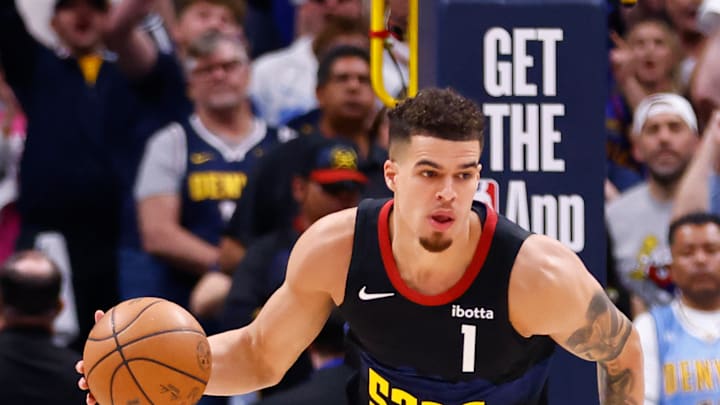Ebbs and flows. The definition of a streaky sharpshooter. His name is Michael Porter Jr., and he has an offseason full of speculation coming his way. After another strong season, averaging 17 points and seven rebounds per game, Porter Jr. entered the playoffs prepared to help bring Denver a second straight championship. After shooting 48 percent, 40 percent on threes, and 84 percent from the free throw line, Porter Jr. looked poised to take pressure off of Jamal Murray and Nikola Jokic.
A great first-round series from MPJ was the difference-maker for Denver in a close, five-game series with the Los Angeles Lakers. The Nuggets were able to win the first round series in five games, making comebacks in nearly every game. In those five games, MPJ averaged a stellar 23 points and eight rebounds per game, shooting 55 percent from the field, a marvelous 49 percent from three, and 77 percent on free throws. Without MPJ's performance, Denver likely gets bounced by the Lakers.
Should the Denver Nuggets trust Michael Porter Jr. or trade him?
Just when it looked like Porter Jr. was breaking his stride and entering the level of a dominant third option, Denver ran into its buzzsaw. The Minnesota Timberwolves took the defending champs out in seven games, winning Game 7 in Denver in a comeback win. Minnesota won three of its four games in Denver for the series, a rare feat for any team in recent memory. Minnesota prioritized shutting down Jamal Murray and limiting Nikola Jokic, which led to increased opportunities for supporting players.
Aaron Gordon struggled for the entirety of the series, as did most of Denver's role players. MPJ was no exception, shooting a pedestrian 37 percent from the field and 33 percent from three in the series. As a result, Porter Jr. averaged just 11 points and 6 rebounds over the seven-game series. Questions remain surrounding Porter Jr.'s impact on winning for Denver, and if he will ever live up to the money he's currently being paid by the organization, entering year three of a five-year, $180 million contract.
Porter is one of the league's best shooters and one of the most consistent ones in the process. While this article opened up with the mention of a 'streaky shooter', Porter Jr. is above the level of a streaky shooter. However, Minnesota turned him into that during the postseason, resulting in arguably the longest 'cold spell' of shooting in his career thus far. Without his jump shooting, Porter Jr. offers good rebounding and length, but only marginal defensive impact at best and zero playmaking.
Now, with six seasons of experience (five playing), it has become common knowledge what Porter Jr.'s game is. He has an extremely large 'green light' and will let it fly from deep whenever he so chooses thanks to his 6'10" frame. However, teams may be catching up on how to defend Porter Jr., making him far less reliable as a shooter. On the flip side, every shooter goes through shooting slumps, and Porter Jr.'s happened to occur at the absolute worst time in the playoffs.
If Denver were to shop Porter Jr., looking for a more reliable, win-now piece would make the most sense. Brandon Ingram on a one-year rental is the most realistic option for the Nuggets, but Denver would have to find a way to resign Ingram. Ultimately, hoping for a better playoff performance from MPJ seems unreasonable considering his role in Denver is set in stone. Even if it's an overreaction to one bad postseason series, Denver needs to fill out its roster if it wants to return to the NBA Finals.
What made Denver dominant in its championship-winning season was a reliable bench that could consistently contribute. Without Bruce Brown and Jeff Green, the Nuggets' bench took a significant hit, and the lack of depth hurt them in the postseason when Porter Jr., Aaron Gordon, and Kentavious Caldwell-Pope struggled. KCP is free agency bound, and Denver can't afford any more losses to their roster. For that, moving Porter Jr. for depth, shooting, and defense is most beneficial to the roster.
